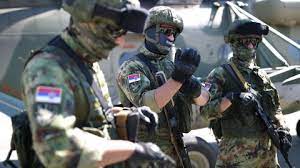
-
Published: 29 December 2022

Tensions between Serbia and Kosovo flared up when Pristina set December 18 as the date for local elections in Serb-majority municipalities, but the most prominent Serbian political party announced its boycott of them.
Yesterday, Serbian President Aleksandar Vucic put the army on high alert amid high tensions in Kosovo, the former Serbian province whose independence Belgrade refuses to recognize and where tensions between its Albanian majority and its Serb minority have recently worsened.
On Monday evening, Serbian Defense Minister Milos Vucevic said in a statement that "the president of Serbia ordered the Serbian army to be at the highest level of combat readiness, that is, at the level of readiness to use armed force". Serbian chief of Staff General Milan moiselovic said on Sunday that the president had ordered him to go to the border area with Kosovo.
"The situation there is difficult and complex," General moiselovic said, stressing that it is necessary to have "the Serbian Army located along the administrative line," the term used by the Serbian authorities to refer to the border line with Kosovo.
The Serbian Interior Ministry said on Monday evening that "all units" of the internal security forces would be"immediately placed under the command of the chief of the General Staff".
On December 10, hundreds of ethnic Serbs in Kosovo blocked major roads in the Serb-majority northern regions to protest the arrest of a former policeman, paralyzing traffic at two border crossings.
General moiselovic confirmed late on Sunday that he was on his way to Raska, a town 10 kilometers from the border with Kosovo, after holding a meeting with Vucic in Belgrade. "The tasks assigned to the Serbian Army.. Accurate, clear and will be fully implemented".
Before moiselovic headed to the border area, several Serbian media broadcast a video circulating on social media in which gunfire could be heard. Media reported that a "clash" took place on Sunday evening when Kosovar troops tried to remove a roadblock to open a road. But the Kosovo police denied in a Facebook post that its forces were involved in any armed clash.
Kosovo interior minister Hilal svikla confirmed that a patrol of the peacekeeping mission in Kosovo "KFOR", which operates under the command of "NATO", was attacked by an armed attack.
For its part, KFOR said it had opened an investigation into "an indirect fire incident that occurred on December 25 near a KFOR-NATO patrol" and involved an unknown number of gunmen. "There were no injuries or material damage and we are working to establish all the facts," kafour said in a statement.
Later, the Kosovar authorities arrested a former policeman suspected of involvement in attacks against ethnic Albanian police officers, which angered the Serbs who resorted to banditry.
In November, hundreds of Serbian policemen in the Kosovo police service, as well as judges, prosecutors and others, went on strike to protest a decision to ban Serbs living in Kosovo from putting Serbian license plates on their cars. But despite the suspension of the implementation of the resolution, the strike of Serbian employees and policemen continued, creating a security vacuum in Kosovo.
Serbian Prime Minister Ana Brnabic warned last week that the situation with Kosovo was "on the verge of sliding into an armed conflict".
